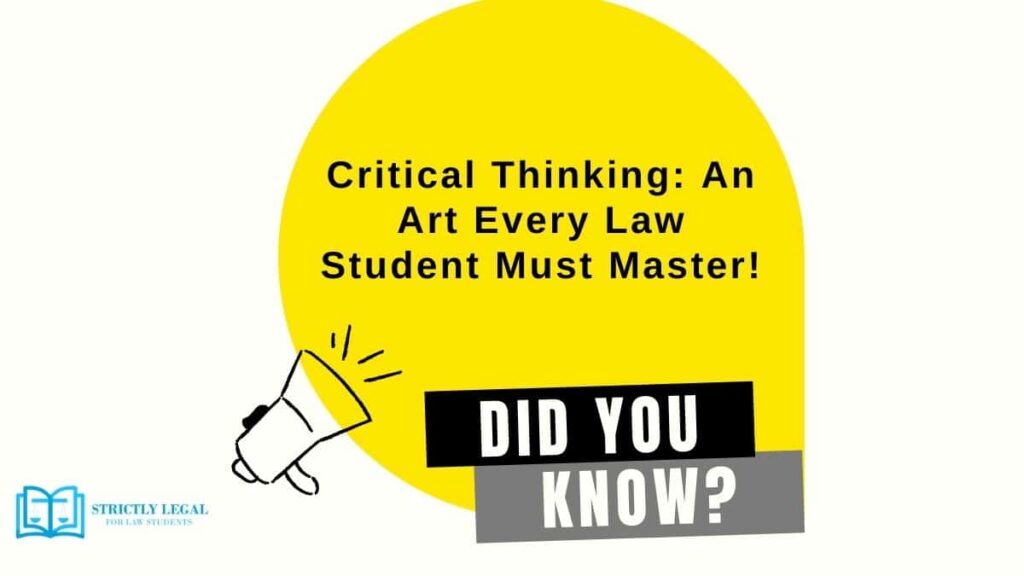Table of Contents
What is critical thinking?
Critical thinking is the ability to think clearly and rationally. It includes the ability to engage in reflective and independent thinking. Someone with critical thinking skills is able to do the following:
- Understand the logical connections between ideas
- Identify, construct, and evaluate arguments
- Detect common mistakes in reasoning
- Solve problems systematically
What do we need to think critically?
It’s crucial that you learn how to think critically, especially as a law student.
Critical thinking is an essential skill that you must develop in order to succeed not just in your legal studies but also in any area of life. As a key component of your cognitive development, it will help you develop the ability to absorb information and generate new ideas on a regular basis. It will give you the tools for effective decision making, critical analysis and problem solving skills.
In order for students to be successful at college, they must be able to think critically about their classes, professors, career options and everything else surrounding them. Critical thinking is different from simply being analytical or imaginative; it means using logic and reasoning with facts rather than imagination alone. Being able to engage in this type of reasoning requires one to focus primarily on the world around them rather than on one’s own emotions or mental processes as well as always asking questions whenever they make decisions or form opinions in order to find additional information they may require. It takes dedication and practice but anyone who can apply it properly can benefit greatly from critical thinking skills that can help improve their grades, career prospects and overall quality of life – so don’t be afraid!
Why is it important for law students?
You would have probably heard the terms “critical thinking” and “analytical thinking” being thrown around from time to time. Everyone claims that they are critical thinkers, but what does it really mean?
Critical thinking is the capacity to assess situations logically and make decisions based on facts rather than emotions or personal bias. Analytical skills, on the other hand, refer to your ability to collect and analyze information, problem-solve, and make decisions. These two sets of skills can be highly useful in both our professional and personal lives.
In any profession where an individual makes a decision (or contributes towards making a decision) for another person or group of people, these skills are essential. Lawyers especially will benefit greatly from having these skills since they need to be objective at all times while arguing their case in court. They also need to be able to pick out flaws in another argument very quickly while preparing their own argument.
How can you improve your critical thinking skills?
The skills of critical thinking are what you need to be able to reflect on your decision-making processes and improve them over time. We all have biases, blind spots, and tendencies that influence our thinking. Many of these are hardwired into our brain’s structure. There are a few simple steps you can take to grow more aware of how you make decisions, as well as how certain types of thought patterns might be holding you back from making better ones.
First things first: it is important to consider the viewpoints of others when deciding something, particularly if you want your decision to be unbiased. If possible, try not to let social factors such as your values or emotions affect your ability to reason objectively about the situation at hand. Everyone has a point of view that is unique, so it is always wise to take the time and do your due diligence in researching other perspectives through listening and observation before coming to any conclusions or taking action on an issue.
Secondly, examining the assumptions that underlie one’s reasoning can help uncover whether they may not actually hold true in every case–or even most cases! For example, if someone assumes all people with disabilities cannot work because “they have too many physical limitations,” then this may lead them towards leaving out large numbers of potential employees who could benefit from working part-time or full-time jobs depending on their abilities (such as those with learning disabilities). This would likely result in less diversity within an organization where only those who fit into specific criteria were hired (which tends towards homogeneity). Also note that this type assumption isn’t just limited by false beliefs about disability status; many preconceived notions about gender identity exist within society today which similarly prevent individuals from being judged fairly by employers for their qualifications rather than personal qualities outside their control (such as sexual orientation).
Thirdly–and perhaps most importantly!–you should always stay open minded when making decisions; otherwise there’s no room for growth! This means being willing ____ ,
Critical thinking skills are essential for law students.
Critical thinking skills are essential for law students. They help you to identify your own biases, understand and tell the difference between fact and opinion, see the big picture, see the connections between ideas, present information clearly and logically, analyze information and make better decisions.
Passionate about using the law to make a difference in people’s lives. An Advocate by profession.

